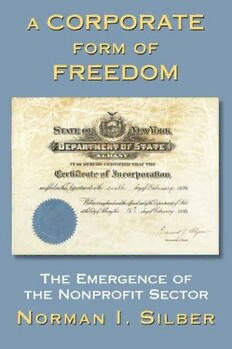
A Corporate Form of Freedom: The Emergence of the Modern Nonprofit Sector PDF
195 Pages·2001·30.257 MB·English
Most books are stored in the elastic cloud where traffic is expensive. For this reason, we have a limit on daily download.
Preview A Corporate Form of Freedom: The Emergence of the Modern Nonprofit Sector
Description:
A Corporate Form of Freedom explores how courts and legislatures have decided which nonprofit groups can pursue their missions as corporations. For many years it was a privilege to hold a nonprofit charter. This view changed during the 1950s and 1960s. A new generation contended that legal theory, racial justice, and democratic values demanded that the nonprofit corporate form be available to all groups as a matter of right. As a result, nonprofit corporate status became America's corporate form for free expression. The new perspective did more than enlarge public discourse, however. It also reduced official authority to supervise or otherwise hold nonprofit organizations accountable for their activities. Norman I. Silber examines how the nonprofit world was transformed -- a transformation which refashioned political and social discourse, altered the economy, and created many of the difficulties the nonprofit sector faces today.
See more
The list of books you might like
Most books are stored in the elastic cloud where traffic is expensive. For this reason, we have a limit on daily download.
